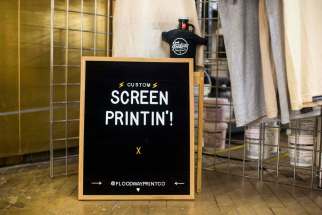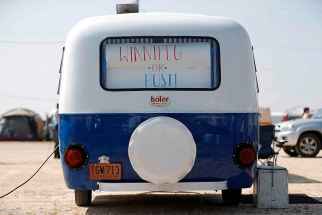A perfect fit for print shop Floodway Print Co. makes new history in former heart of city's garment industry
Read this article for free:
or
Already have an account? Log in here »
To continue reading, please subscribe:
Monthly Digital Subscription
$0 for the first 4 weeks*
- Enjoy unlimited reading on winnipegfreepress.com
- Read the E-Edition, our digital replica newspaper
- Access News Break, our award-winning app
- Play interactive puzzles
*No charge for 4 weeks then price increases to the regular rate of $19.00 plus GST every four weeks. Offer available to new and qualified returning subscribers only. Cancel any time.
Monthly Digital Subscription
$4.75/week*
- Enjoy unlimited reading on winnipegfreepress.com
- Read the E-Edition, our digital replica newspaper
- Access News Break, our award-winning app
- Play interactive puzzles
*Billed as $19 plus GST every four weeks. Cancel any time.
To continue reading, please subscribe:
Add Free Press access to your Brandon Sun subscription for only an additional
$1 for the first 4 weeks*
*Your next subscription payment will increase by $1.00 and you will be charged $16.99 plus GST for four weeks. After four weeks, your payment will increase to $23.99 plus GST every four weeks.
Read unlimited articles for free today:
or
Already have an account? Log in here »
Hey there, time traveller!
This article was published 16/08/2018 (2671 days ago), so information in it may no longer be current.
In November 2017, three years after starting a small screen-printing business in an 800-square-foot shoebox on Portage Avenue, Cory Beal, the founder of Floodway Print Company, decided it was time to find a bigger space.
Beal went around the city to view two dozen storefronts, most of which were in industrial parks or areas that didn’t exactly inspire creativity. But when he climbed the stairs to the fourth floor of the Glengarry Block, a 108-year-old neoclassical warehouse overlooking McDermot Avenue, and the cheapest listing on the docket, something felt right.
“It just felt well-suited to the garment manufacturing industry,” Beal says Thursday afternoon, as two employees meticulously apply white plasticol paint to a seemingly never-ending stream of tote bags and T-shirts. He probably sensed that because, for a long time, the building was at the core of the city’s booming garment trade, often referred to as the “schmatta business.”

When Beal and his three co-workers started prepping the nearly 5,000-square-foot unit after acquiring it last fall, they slowly began to uncover hints at the building’s historical fabric, so to speak: under baseboards, and between floorboards, they found denim patches, old pins and sewing needles, and lots of buttons. Beal, 28, was fascinated by the findings. Whose were they? What were they used to make?
“It’s sort of an artifact of what was here,” he says, holding up a business card bearing a five-digit phone number.
As it turns out, the Glengarry Block housed dozens of clothing-industry companies during the Exchange District’s heyday, including S. Groff & Son (which sold thread, fabric and buttons); Goodbolt, a shoe and boot operation; and J.K. Marshall, a milliner and silk manufacturer. What the Floodway employees have discovered is that the building is as conducive to the clothing business in 2018 as it was in 1918, and the significance of where they can print as many as 2,000 shirts a day isn’t lost on them.
“I’m not big on history,” says Riley Taylor, the company’s 20-year-old production supervisor. “But you can really feel it in here. It’s almost like we’re bringing that history back to life.”
Floodway’s comparatively short story started in 2014, when Beal, who’d worked in screen-printing shops around the city, decided to strike out on his own. He’d been frustrated by the existing screen-printing options, lamenting their quality of product and of communication. He realized the barriers to entering the business independently were low, so he bought a pair of manual printing apparatuses online. “We started for less than $5,000,” he says.
Over time, through word-of-mouth and dedication to Instagram-based marketing, the floodgates opened for Floodway. In 2015, they scored a contract to print the shirts for ManyFest, and soon, other local businesses and players took note. The company’s diverse and lengthy clientele now includes The Forks, Little Brown Jug, Siloam Mission, King + Bannatyne, and the Gimli Film Festival. Those “Winnipeg is Good” shirts you’ve seen everywhere? Floodway printed those, too.
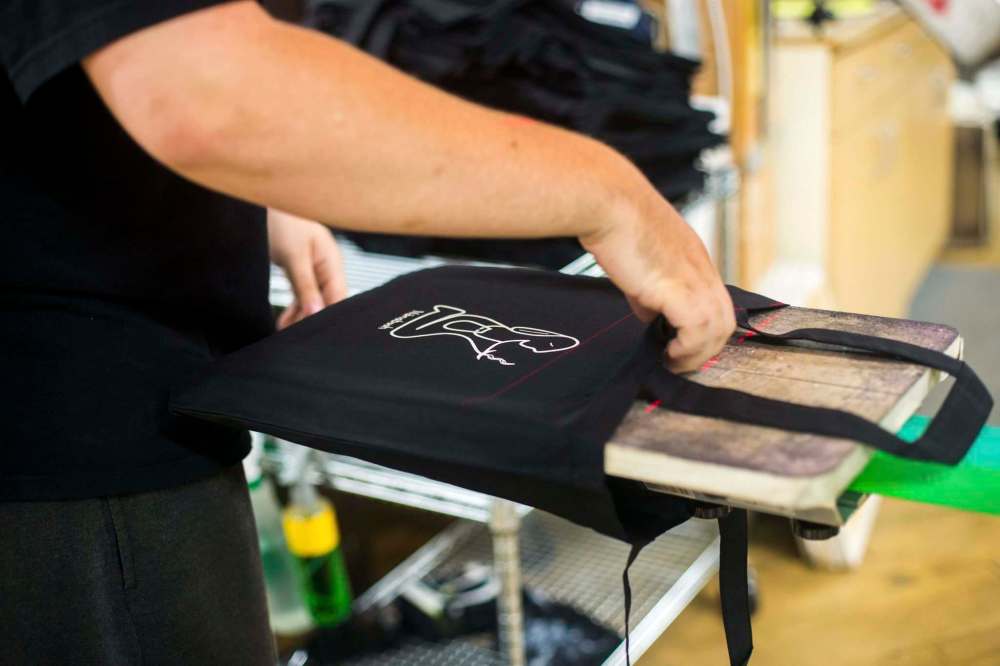
“They were a natural fit for (us)… Every good band needs a good shirt,” said Gilad Carroll, a co-founder of Real Love Winnipeg, a local concert promotion company and one of Floodway’s earliest clients. “They are on top of everything and clearly have a desire to grow and do great things in Winnipeg.”
As more clients got in contact, Beal knew it was time to expand. In the move to the McDermot location, the company invested more than $100,000, most of which was spent on a brand-new automatic press capable of printing 10 shirts at once. “It can do 2,000 garments without breaking a sweat,” he says. The manual press can do about 500. With one purchase, Floodway increased its production rate four fold. Last year, the company made about $400,000 in revenue. This year, Beal expects that figure to be near half-a-million dollars.
But Beal said Floodway wasn’t designed as a business to pump out as many shirts as possible. The shop prefers smaller orders over large ones, and does about 95 per cent of its business with clients in Manitoba. Of the company’s roughly 15 garment distributors, a dozen are Canadian. “Doing business here is and always will be our priority,” says Beal, who usually wears plain white T-shirts. Thursday, he’s testing out a Gildan model, “seeing how it feels after a wash.”
One aspect of business Beal says he emphasizes is accessibility. Two of his employees, Taylor and Bram Keast, a 25-year-old fine arts graduate from the University of Manitoba, were hired through REES, a Winnipeg employment service agency for people with physical disabilities or other health conditions.
Keast, who wears hearing aids, called the shop “an amazing place to work,” and said the act of making T-shirts is a lot like painting or sculpting, only your work is on display all around the city.
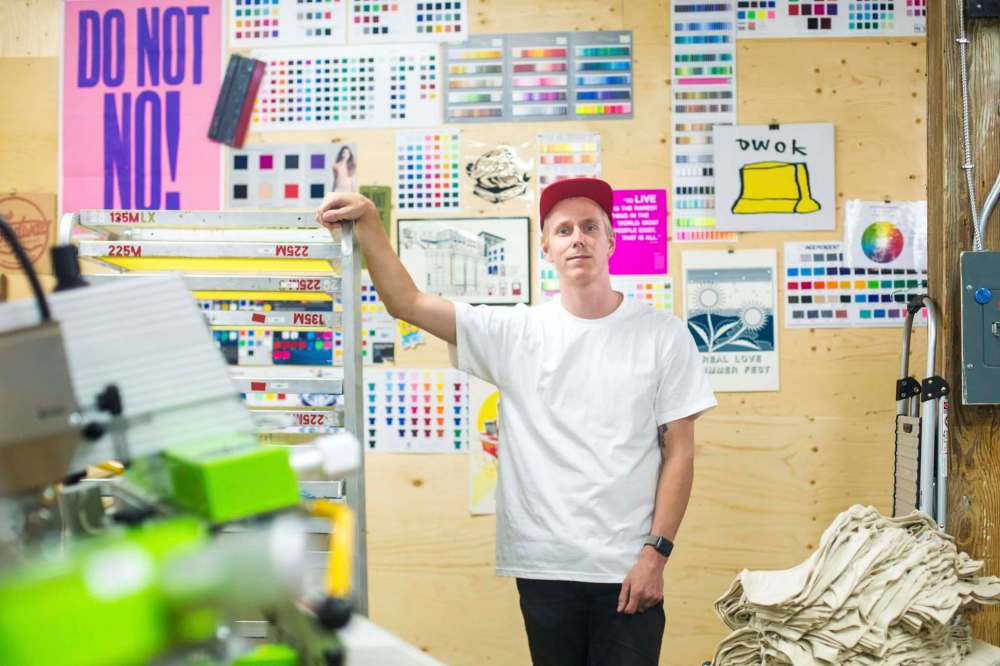
“Clothing is one of the most basic human needs,” says Taylor as he finishes another tote bag. “Making clothing for people speaks to me on a primal level.”
Beal says the screen-printing business in Winnipeg is a competitive one, with several more senior outlets.
But he hopes potential clients continue to respond to his company’s attention to detail.
As Taylor and Keast man the presses, Beal sits at a table in the back, taking a moment to breathe a few feet from the production floor.
He says he’s satisfied with how the company has grown in such a short period of time, and he’s happy to be doing it in a building that was built with clothing manufacturing in mind.
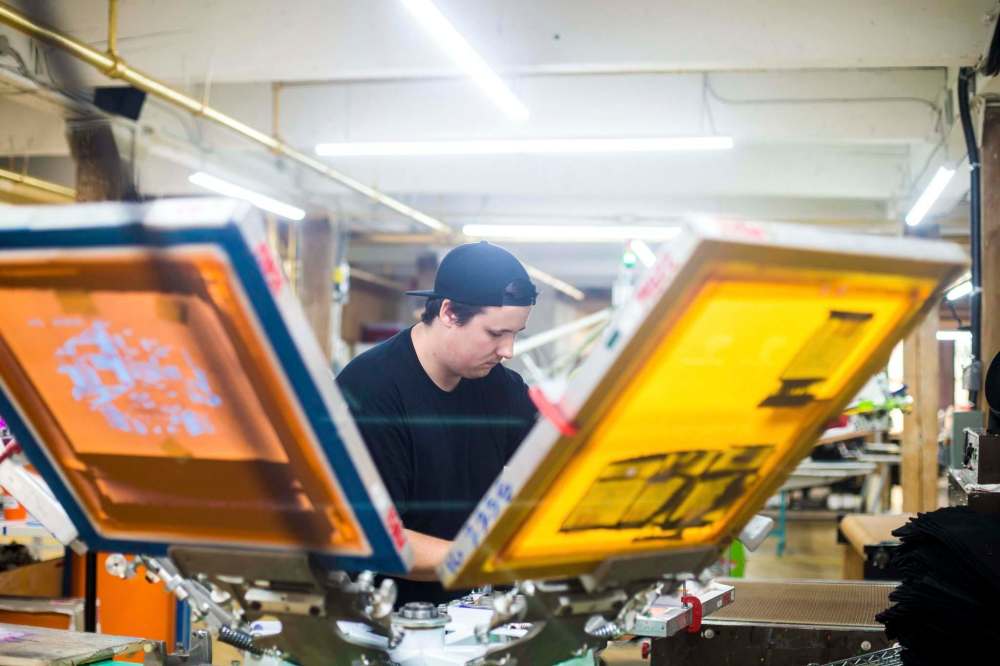
“Every detail of this place was perfect,” he says. “It makes me wonder why everybody isn’t moving into the neighbourhood.”
ben.waldman@freepress.mb.caTwitter: @benjwaldman

Ben Waldman covers a little bit of everything for the Free Press.
Our newsroom depends on a growing audience of readers to power our journalism. If you are not a paid reader, please consider becoming a subscriber.
Our newsroom depends on its audience of readers to power our journalism. Thank you for your support.





